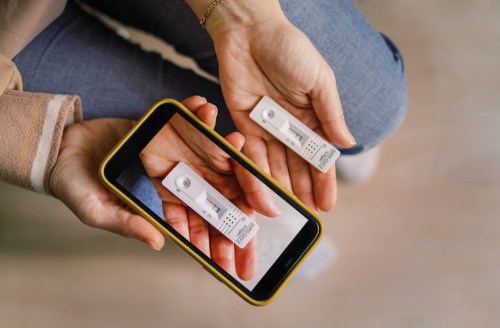Should You Swab Your Throat When COVID Testing At-Home? We Asked Experts To Weigh In.
Experts explain why you shouldn't do a throat swab for at-home COVID testing, and they break down what to do instead.

Given the wave of COVID-19 cases due to the Omicron variant, more people than ever are reaching for at-home antigen tests to assess whether or not they have the virus. This is a good thing—at-home antigen tests involve using a nasal swab to detect the virus and allow people to get results in a few minutes. But over the last few weeks, you might’ve seen TikTok videos and articles about whether doing a throat swab a nasal test kit is more effective at detecting Omicron. So, to help clear up confusion, we asked two epidemiologists to weigh in on whether or not you should swab your throat when you take a COVID test.
Experts in This Article
social epidemiologist and professor at University of California, Irvine, who specializes in the study of stroke and cardiovascular disease
Dean of School of Health Sciences and Practice at New York Medical College
What does the research stay about throat swabs
National Public Radio (NPR) looked into the “hack” and found a pre-print study from researchers at the University of Cape Town in South Africa. Researchers looked into whether or not PCR tests could detect Omicron using saliva swabs and nasal swabs. They found that, in Delta cases, saliva swabs detected COVID-19 around 71 percent of the time while nasal swabs clocked in at 100 percent accuracy. When it comes to Omicron cases, however, saliva swabs detected COVID-19 100 percent while nasal swabs had 86 percent accuracy. However, NPR highlights a few important distinctions: The study hasn’t yet been peer-reviewed, meaning no outside scientists in the field have verified the findings. And, the study used PCR or laboratory tests, not home kits.
Should you swab your throat when using a nasal test kit
“Nasal swabs are still the standard for testing. Saliva specimens also can be sent for testing, but may not be as reliable and are not widely available at present,” says Robert Amler, MD, the dean of School of Health Sciences and Practice at New York Medical College and a former chief medical officer at the CDC Agency for Toxic Substances and Disease Registry, where he specialized in infectious diseases. There are rules about different spit-based tests, he explains. For example, you need to submit spit first thing in the morning before eating or drinking, which might make your at-home experimentation ineffective.
Additionally, The Food and Drug Administration (FDA) advises against swabbing the throat during self-testing—particularly for safety concerns. “Self-collection via throat swab is more complicated and when done incorrectly, can cause harm,” says Bernadette Boden-Albala, MPH, DrPH, director and founding dean at the University of California, Irvine Program in Public Health. People can injure their throats with the at-home test swabs, and it hasn’t been tested enough to say it’s accurate at detecting COVID-19.
When you’re worried about having and spreading COVID-19, it can be tempting to try anything to get the most accurate result. But while false positives are possible, the FDA says that false positives on PCR and at-home COVID-19 tests are rare when testing an infectious person exhibiting symptoms or after recent exposure. They offer some insights as to why there are occasionally false positives, claiming that, often, not following the directions properly can lead to false positives. Therefore, use your at-home tests as directed to avoid any confusion. It’s essential to reduce the spread of coronavirus by having accurate testing information.
Here’s when you might encounter throat swab tests
Some tests, like those in the UK, do use a throat swab, so keep that in mind if you are testing outside of the United States. Additionally, a healthcare provider trained in collecting samples may want a throat swab at some point—either because of changing guidelines, new tests, or to rule out other illnesses such as strep throat.
The recommendations might change in the future, so keep up to date on the latest guidelines and information. It’s possible throat swabbing might be a way to test for COVID or certain variants of COVID, but at this time, there is not enough reliable information on the practice, so always follow the directions on the box. Misusing the test can result in an inaccurate result and, therefore, a wasted test. Especially since testing supplies are in high demand and supplies are dwindling, don’t waste a test on an unproven theory.
Oh hi! You look like someone who loves free workouts, discounts for cutting-edge wellness brands, and exclusive Well+Good content. Sign up for Well+, our online community of wellness insiders, and unlock your rewards instantly.
Sign Up for Our Daily Newsletter
Get all the latest in wellness, trends, food, fitness, beauty, and more delivered right to your inbox.
Got it, you've been added to our email list.










